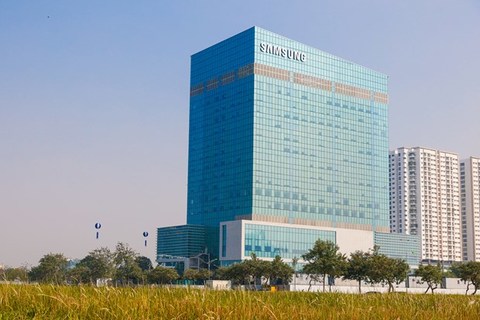
A view of Samsung's research and development (R&D) centre in Hà Nội. Việt Nam has regarded science-technology and innovation as one of the most important strategic breakthroughs. — Photo vietnamplus.vn
Foreign investment has proven itself as a dynamic economic sector, with significant contributions to the growth of the national economy as well as its integration into the world, heard a recent workshop in Hà Nội.
The event was jointly held by the Ministry of Science and Technology (MoST) and the Ministry of Planning and Investment to mark 35 years of Việt Nam’s foreign investment attraction.
Deputy Minister of Planning and Investment Trần Duy Đông highlighted foreign investment’s positive impacts on the reform of economic institutions and the improvement of the domestic business environment, the State apparatus, and Việt Nam’s reputation and position in the international arena.
The official cited statistics as showing that Việt Nam has so far counted 38,084 valid foreign-invested projects with a total registered capital of US$453.26 billion, of which nearly $287.1 billion has been disbursed.
In the first eight months of this year, the country attracted 1,924 new projects, while 830 others registered to adjust their investment capital, and 22,268 transactions of capital contribution for share purchases were recorded in the period with a combined value of nearly $18.15 billion.
Deputy Minister of Science and Technology Lê Xuân Định called foreign investment a bright spot since Việt Nam started to embark on reforms in 1986, adding that the source of capital contributed to sharpening the national economy’s competitiveness, generating jobs and raising the State budget collection.
The official noted a string of policies adopted by the Party and the State to boost foreign direct investment (FDI) and improve its efficiency.
Việt Nam regarded science-technology and innovation as one of the most important strategic breakthroughs, Đông said, pointing to positive outcomes the country has recorded in luring foreign investment in this regard, with the presence of such tech giants as Intel and Samsung.
However, limitations still remain in technology transfer, said Đặng Đình Tùng, deputy head of the MoST’s Department of Technology Appraisal, Examination and Assessment, elaborating that although there were 400 technology transfer agreements by FDI firms recorded in Việt Nam between July 2018 and the end of 2022, they were only in the parent-subsidiary relationship, with no effects on others.
According to the MoST, among the more than 100 multi-national groups investing in the Southeast Asian nation, only Samsung and LG of the Republic of Korea (RoK) have built their research and development (R&D) centres in Hà Nội.
Đông stressed that the competition pressure from FDI firms had prompted domestic businesses to raise their productivity and revamp technology, thus better adapting to globalisation.
However, Vietnamese enterprises had not been able to absorb technologies from FDI firms yet, he said, proposing policies and mechanisms to link domestic and foreign enterprises, covering support industry development, and connectivity in product supply chains.
At the same time, domestic businesses needed to proactively seek technology transfer channels, he said. — VNS